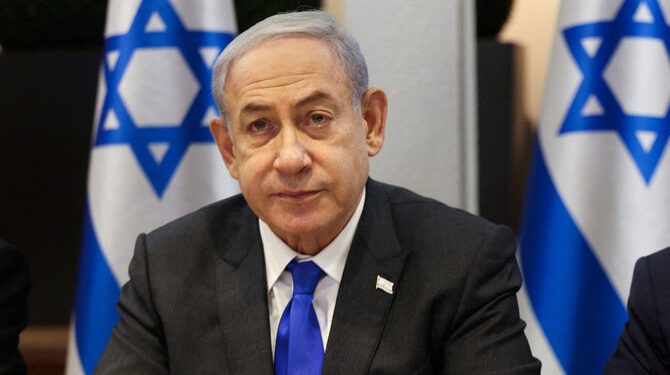In the aftermath of Iran’s unprecedented direct attack on Israel, Prime Minister Benjamin Netanyahu finds himself at a crucial juncture, torn between the prospects of all-out war and the imperative of de-escalation. The recent escalation in tensions has thrust Netanyahu and Israel into the spotlight, with the world closely watching their response to the unfolding crisis.
Iran’s Bold Move:
The weekend saw a significant escalation in the longstanding conflict between Iran and Israel, as Iran launched hundreds of missiles and drones directly targeting Israeli territory. This marked the first time in over three decades that a sovereign state has directly attacked Israel, raising concerns about the potential for a wider regional conflagration.
Netanyahu’s Dilemma:
Facing this unprecedented challenge, Netanyahu is confronted with a difficult dilemma. On one hand, there are calls for a swift and powerful response to Iran’s aggression, particularly from within Netanyahu’s far-right coalition partners. These voices advocate for a decisive military action to deter future attacks and assert Israel’s strength in the face of adversity.
On the other hand, there are concerns about the consequences of escalating the conflict further. Netanyahu must weigh the risks of sparking a full-blown war against the imperative of avoiding a destabilizing regional conflict with unpredictable outcomes. Additionally, pressure from international allies, particularly the United States, adds another layer of complexity to Netanyahu’s decision-making process.
International Response and Pressure:
As tensions escalate, the international community is closely monitoring Netanyahu’s response to the crisis. The United States, Israel’s staunch ally, has expressed support while urging restraint to prevent further escalation. Other regional players, including neighboring Arab states, are also watching the situation with apprehension, wary of being drawn into a broader conflict.
Netanyahu’s Political Calculus:
Amidst the escalating crisis, Netanyahu’s leadership is facing renewed scrutiny, both domestically and internationally. With calls for early elections growing louder and looming corruption charges adding to the pressure, Netanyahu’s handling of the crisis could have significant implications for his political future.
Path Forward:
As Netanyahu navigates this perilous terrain, the path forward remains uncertain. While the prospect of all-out war looms large, there are also opportunities for diplomatic engagement and de-escalation. Ultimately, Netanyahu’s decision in the coming days will shape the course of events in the region and have far-reaching consequences for Israel and beyond.
In the face of Iran’s unprecedented attack, Netanyahu confronts one of the most significant challenges of his leadership. As he weighs the options of all-out war or de-escalation, the stakes could not be higher. The world watches with bated breath as Israel’s response to the crisis unfolds, knowing that the decisions made in the coming days will reverberate across the Middle East and beyond.
















